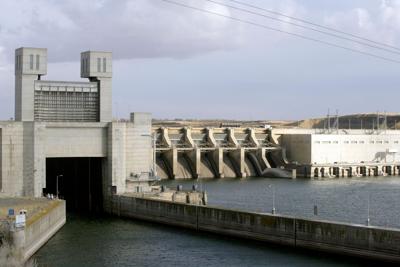Three federal agencies affirmed July 31 that breaching four Lower Snake River dams in Eastern Washington would have high social and economic costs and require Congress to authorize it.
Barges that carry wheat would be stranded, as would farmers’ irrigation pumps. And electric rates would rise, as would the chances for power blackouts, according to a report by the Army Corps of Engineers, Bureau of Reclamation and the Bonneville Power Administration.
The final environmental statement impact lays the foundation for a decision in September on operating 14 federal dams on the Columbia and Snake rivers. A federal judge in Oregon ordered the environmental review.
The final report mirrors a draft report released in February. The agencies continued to favor spilling more water over dams in the spring to help wild salmon and steelhead protected under the federal Endangered Species Act.
The agencies rejected pleas from environmental and fishing groups to breach Lower Granite, Little Goose, Lower Monumental and Ice Harbor dams on the lower Snake River.
The report acknowledged that breaching the dams would do more for fish. But it also would damage the federal system’s other uses, such as flood control, irrigation, navigation, recreation and electricity generation.
The agencies said they couldn’t breach the dams unless Congress changed their mandate. They said they studied the option because of the judge’s order and public comments.
In a press release, the agencies said their preferred alternative for managing the rivers complies with President Trump’s order to secure reliable water supplies in the West.
Environmental and fishing groups said they were outraged, urging Congress to intervene and predicting lawsuits.
“The federal plan totally and completely fails Idaho and isn’t good enough for the many guides, outfitters, river businesses and communities in Idaho that depend on healthy runs of fish,” Idaho Conservation League executive director Justin Hayes said in a statement.
“The Trump administration’s reckless rush to finalize the Columbia Basin hydropower review process is heartbreaking and immoral,” said Natural Resources Defense Council senior attorney Giulia Good Stefani.
Washington Grain Commission CEO Glen Squires said the report presents all the drawbacks to breaching dams. He also predicted that farm groups will need to continue to explain the dams’ benefits.
“It’s probably never going away as an issue,” he said. “We know there are people constantly arguing to remove those dams. There obviously has to be somebody on the other side of the issue.
“The wheat industry is supportive of a balanced salmon recovery effort. We don’t believe breaching dams is the answer, and that’s essentially what the federal agencies concluded as well,” Squires said.
If the four dams were gone, greenhouse gas emissions would increase, according to the government report. Natural gas-fired power plants would have to ramp up, unless more expensive and less reliable wind and solar power sources were built.
Farmers would be forced to move crops, mostly wheat, by trucks and trains. Transportation costs for wheat farmers would increase 10% to 33%, the report estimates. Irrigation water would be cut off for 48,000 acres, costing farmers $460 million a year in lost sales and their employees $232 million in lost wages, according to the report.
“We are pleased to see the agencies support a preferred alternative that balances clean hydropower, efficient navigation and critical water supplies with ongoing salmon recovery efforts,” said Kristin Meira, Pacific Northwest Waterways Association executive director, in a press release. “The Columbia and Snake rivers mean many things to many people in our region, and that includes the role they play as a significant transportation network for freight, the cruise industry and much more.”

